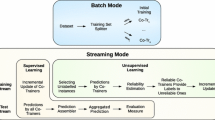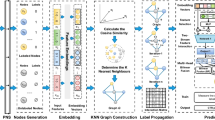Abstract
The information on the World Wide Web is growing without bound. Users may have very diversified preferences in the pages they target through a search engine. It is therefore a challenging task to adapt a search engine to suit the needs of a particular community of users who share similar interests. In this paper, we propose a new algorithm, Ranking SVM in a Co-training Framework (RSCF). Essentially, the RSCF algorithm takes the clickthrough data containing the items in the search result that have been clicked on by a user as an input, and generates adaptive rankers as an output. By analyzing the clickthrough data, RSCF first categorizes the data as the labelled data set, which contains the items that have been scanned already, and the unlabelled data set, which contains the items that have not yet been scanned. The labelled data is then augmented with unlabelled data to obtain a larger data set for training the rankers. We demonstrate that the RSCF algorithm produces better ranking results than the standard Ranking SVM algorithm. Based on RSCF we develop a metasearch engine that comprises MSNSearch, Wisenut, and Overture, and carry out an online experiment to show that our metasearch engine outperforms Google.
This work is supported in part by grants from the Research Grant Council of Hong Kong, Grant No HKUST6079/01E, DAG01/02.EG05, and HKUST6185/02E.
Access this chapter
Tax calculation will be finalised at checkout
Purchases are for personal use only
Preview
Unable to display preview. Download preview PDF.
Similar content being viewed by others
References
Bartell, B., Cottrell, G., Belew, R.: Automatic combination of multiple ranked retrieval systemss. In: Proceedings of the 17th annual international ACM SIGIR conference on Research and development in information retrieval, Dublin, Ireland, pp. 173–181 (1994)
Cohen, W., Shapire, R., Singer, Y.: Learning to order things. Journal of Artificial Intelligence Research 10, 243–270 (1999)
Fuhr, N.: Optimum polynomial retrieval functions based on the probability ranking principle. ACM Transactions on Information Systems 7, 183–204 (1989)
Joachims, T.: Evaluating retrieval performance using clickthrough data. In: Proceedings of the ACM SIGIR Workshop on Mathematical/Formal Methods in Information Retrieval, Tampere, Finland (2002)
Boyan, J., Freitag, D., Joachims, T.: A machine learning architecture for optimizing web search engines. In: Proceedings of the AAAI workshop on Internet-Based Information Systems, Portland, Oregon (1996)
Joachims, T.: Optimizing search engines using clickthrough data. In: Proceedings of the eighth ACM SIGKDD international conference on Knowledge discovery and data mining, Edmonton, Alberta, Canada, pp. 133–142 (2002)
Bennet, K., Demiriz, A.: Semi-supervised support vector machines. Advances in Neural Information Processing Systems 11, 368–374 (1998)
Blum, A., Mitchell, T.: Combining labeled and unlabeled data with co-training. In: Proceedings of the eleventh annual conference on Computational learning theory, Madison, Wisconsin, United States, pp. 92–100 (1998)
Goutte, C.: Note on free lunches and cross-validation. Neural Computation 9, 1245–1249 (1997)
Author information
Authors and Affiliations
Editor information
Editors and Affiliations
Rights and permissions
Copyright information
© 2004 Springer-Verlag Berlin Heidelberg
About this paper
Cite this paper
Tan, Q., Chai, X., Ng, W., Lee, DL. (2004). Applying Co-training to Clickthrough Data for Search Engine Adaptation. In: Lee, Y., Li, J., Whang, KY., Lee, D. (eds) Database Systems for Advanced Applications. DASFAA 2004. Lecture Notes in Computer Science, vol 2973. Springer, Berlin, Heidelberg. https://doi.org/10.1007/978-3-540-24571-1_48
Download citation
DOI: https://doi.org/10.1007/978-3-540-24571-1_48
Publisher Name: Springer, Berlin, Heidelberg
Print ISBN: 978-3-540-21047-4
Online ISBN: 978-3-540-24571-1
eBook Packages: Springer Book Archive




